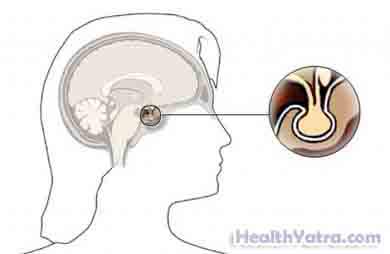Definition
Girls enter puberty between the ages of 8-14. Boys enter this stage between the ages of 9-14. Sometimes the physical changes may happen earlier. This is called precocious sexual development or premature puberty.
For girls, this means that before the age of eight they may:
- Develop breasts
- Have armpit or pubic hair
- Have mature sex organs
- Experience their first period
For boys, this means before the age of nine they may have:
- Enlarged sex organs
- Armpit, pubic, or facial hair
Causes
In about 25%-75% of affected boys, this condition is due to an underlying medical conditions. However, for many girls and some boys there is no known cause.
Some known causes of premature sexual development include:
- Hormone-secreting tumor (gonadotropin-secreting tumor)
- Severe hypothyroidism
- Congenital adrenal hyperplasia
- McCune-Albright syndrome (females)
- Adrenal tumor
- Tumor or lesion
- Central nervous system
- Pituitary gland

Causes specific to girls:
- Having ovarian tumor or cysts
- Taking estrogen
Causes specific to boys:
- Having tumors on the testicles
- Taking male sex hormones (androgens)
Other causes:
- Acute head trauma
- Central nervous system infection
- Radiation treatment
Risk Factors
Factors that increase the risk of precocious puberty include:
- Sex: girls are 2 to 5 times more likely to experience premature puberty than boys
- Family history—some cases may run in families
- Taking sex hormones
- Head injury
- Radiation of head
- Infection in brain
- Some studies have suggested a link between obesity and premature puberty
Symptoms
One symptom common to both boys and girls is a premature growth spurt in height. Children with this condition may be taller than their peers. As an adult, they may be shorter. The rapid growth also makes their bones stop growing sooner than normal. Other symptoms include:
- In girls, early arrival of:
- Breast development
- Pubic hair
- Armpit hair
- Onset of period
- Ovary enlargement
- Cysts on ovaries
- In boys, early arrival of:
- Facial hair
- Armpit hair
- Pubic hair
- Penis growth
- Increased masculinity
- Testicle enlargement
- In both girls and boys, early arrival of:
- Body odor
- Acne
- Behavior changes
- Growth spurt
Diagnosis
The doctor will ask about your child’s symptoms and medical history. A physical exam will be done. An assessment of puberty milestones and growth will be done. An x-rayof the left wrist bone may also be taken. This will help to assess if the bone growth is normal for your child’s age.
Depending on these results, other tests may be ordered, including:
- Adrenal and pelvic ultrasound —images of kidneys and sexual organs created by sound waves
- Testicular ultrasound if testicular enlargement is uneven
- MRI of the brain—detailed images of the brain
- Blood tests to measure the levels of hormones such as:
- In girls: follicle-stimulating hormone (FSH), luteinizing hormone (LH)
- In boys: testosterone
- Human chorionic gonadotropin (hCG) levels—hormone that affects growth
- Thyroid hormone levels—if hypothyroidism suspected
- Growth hormone-releasing hormone (GHRH) stimulation test
- Dehydroepiandrosterone (DHEA) levels—early form of sex hormones
Treatment
The treatment depends upon the cause.
If the bone age is about the same as the child’s actual age and there is no known cause, there is no treatment. The child will continue to be monitored. Psychological support may be recommended if a child is struggling.
Other children may require treatment. This may include medication or surgery.
Medications
Medication is often used in children whose bone age is older than their actual age. These medications stop or slow sexual development. They also halt the rapid bone growth and encourage normal growth.
These medications called hormone suppressors may include:
- Leuprolide acetate
- Histrelin
- Nafarelin
Metformin has also been shown to be effective in delaying puberty.
Psychological Support
Developing before their peers may cause social challenges in some children. Psychological support may be helpful. Talk to your child’s doctor about what options are available.
Surgery
Surgery may be needed if the early puberty is caused by a tumor or other lesions. The procedure will depend on the location and size of the tumor.
Ongoing Monitoring
The doctor will continue to check your child’s height, weight, and sexual development. This will help to note any changes or show if the treatment has been effective.
Prevention
Most precocious development cannot be prevented. To help reduce the chance, make sure your child is kept as healthy as possible. This includes making sure they are eating well and getting all the nutrients they need. Help your child maintain a healthy weight. Avoid exposure to sex hormones.
